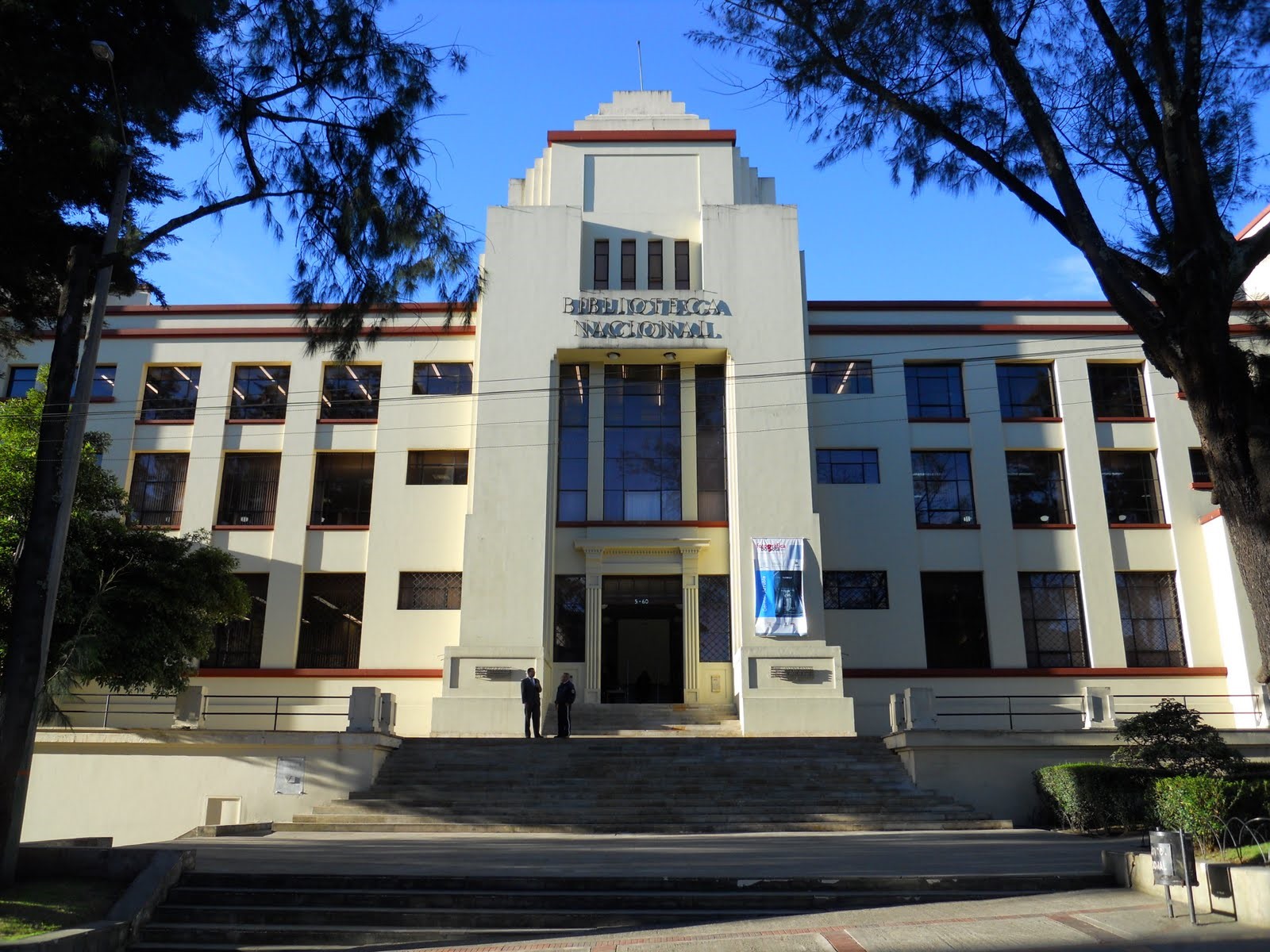Johanna Gallego Gutiérrez is Digital Deposit Manager for Biblioteca Nacional de Colombia, in Bogotá
La Biblioteca Nacional de Colombia ha iniciado la construcción del Archivo de la web y de recursos estáticos digitales sobre proceso de paz y posconflicto en Colombia. Esta iniciativa pretende recolectar, custodiar, preservar y divulgar, para las generaciones presentes y futuras, la historia web del importante momento que vivimos en nuestro país, a través de las herramientas especializadas de harvesting que permiten la copia de sitios web, recopilan su contenido, diseño y arquitectura.

Biblioteca Nacional de Colombia. Foto por: Confidencial Colombia. Agosto 9, 2016.
Este interés surge, principalmente, por el actual proceso de paz que vive Colombia con las FARC, el mayor grupo guerrillero en el país y con mayor alcance militar. Pues, tras más de 50 años de guerra, nuestro país ha comenzado uno de los capítulos más anhelados por la mayoría de los colombianos.
Es importante resaltar que el escenario de producción en Colombia ha tenido un crecimiento importante desde la esfera digital; sin embargo, no hay una excepción en la legislación que le permita a la Biblioteca Nacional de Colombia realizar la preservación de este patrimonio. Además, las implicaciones de realizar la preservación web en casa, teniendo en cuenta que el dominio .co se ha vendido, es usado de manera comercial y su cosecha no garantizaría la salvaguardia de la web colombiana, por esto y teniendo en cuenta la compleja realidad, se ha iniciado un proyecto en alianza con la Universidad Externado de Colombia para la recolección selectiva sobre la producción web de proceso de paz y posconflicto.
En América Latina, Colombia es el segundo país que adelanta un proyecto de preservación web, el primero es Chile. Con este panorama y gracias al apoyo de las bibliotecas nacionales de España, Portugal y Chile hemos comenzamos una prueba piloto para incursionar con herramientas como Herirtix, NAS, CWeb y Wayback Machine, para realizar una recolección más sistemática, pues actualmente nos encontramos realizando la recolección con HTTrack.
De esta manera, los contenidos quedarán en la memoria digital colombiana de manera que puedan ser estudiados y re-significados, desde la compresión de una historia marcada por la guerra.
Nuestra experiencia nos ha indicado que la información que circula en Internet es volátil, pues un porcentaje de las páginas web de medios que han cubierto el proceso han desaparecido, los dominios de iniciativas ciudadanas que apoyaron o estuvieron en contra del plebiscito para aprobar los acuerdos de paz ya no existen y otras cuentas de Twitter no se encuentran hoy en día, es el caso del cuenta de Twitter del Ejército de Liberación Nacional, conocido como el ELN, la segunda guerrilla más grande de Colombia, dicha cuenta fue suspendida por la empresa de microbbloging, sin embargo, la Biblioteca Nacional de Colombia realizó copias de algunos de los tweets con la autorización del grupo guerrillero, de esta manera esta información no se perdió y se encuentra custodiada por la Biblioteca. Esta situación nos pone en alerta sobre la urgencia de avanzar en el tema rápidamente.
En la actualidad se encuentran bajo nuestra custodia y preservación los sitios web gubernamentales del Alto Comisionado para la Paz, Mesa de Conversaciones de La Habana, Territorios por la Paz; sitios web extranjeros como Pax Christi Holanda en Colombia y Colombian Caravana; páginas web y cuentas de Twitter del ELN como Voces ELN y Ranpal, iniciativas de la comunidad como Pares y Ciudadanos, entre otras páginas, pero este sólo es el principio.
Hasta ahora hemos empezado un camino para salvaguardar el patrimonio digital de un país en transición, enfrentando los retos que implica la selección de la web y la presencia de múltiples voces y perspectivas, la gestión de derechos de cada uno de estos recursos y su preservación. La Biblioteca celebra los retos que conlleva preservar la web y continuará trabajando para que las generaciones futuras no desconozcan su pasado y estén condenadas a repetirlo.
Processes of a Peace and Post-Conflict Web Archive
The National Library of Colombia has begun the construction of its Archive for web and static digital resources on peace and post-conflict processes in Colombia. This initiative aims to collect, guard, preserve and disseminate the web history of this important moment in which our country is living, for present and future generations. The task is undertaken using specialized harvesting tools which allows the copying of websites, collection of their content, design and architecture.
This project is possible mainly because of the current peace process; peace with the Revolutionary Armed Forces of Colombia (FARC), the largest guerrilla group with the greatest military reach in the country. So, after more than 50 years of war, our country has begun a period long awaited by many Colombians.
It is important to highlight that the production scenario in Colombia has had an important growth in the digital sphere; however, there is no exception in the legislation that allows the National Library of Colombia to preserve this growth, this heritage. In addition, the implications of carrying out web preservation, considering that the .co domain has been sold and is used commercially, do not guarantee the safeguarding of the Colombian web. Taking into account this complex reality, a project has been started in partnership with the Externado de Colombia University for the selective collection of the web production of the peace and post-conflict process.
In Latin America, Colombia is the second country to advance a web preservation project like this, the first is Chile. With this view and thanks to the support of the national libraries of Spain, Portugal and Chile we have begun a pilot test to experiment with tools such as Herirtix, NAS, CWeb and The Wayback Machine, to make a more systematic collection, because we are currently doing the collection with HTTrack.
In this way, the contents will remain in the Colombian digital memory so that they can be studied and re-signified; an understanding of a history marked by war.
Our experience has indicated that the information circulating on the Internet is volatile, since a percentage of the media web pages which have covered the process have now disappeared, and the domains of several private initiatives which supported, or were against, the vote for peace no longer exist. Some Twitter accounts are not found today, such as the account of the National Liberation Army, known as the ELN, the second largest guerrilla in Colombia. This account was suspended by Twitter. However, the National Library of Colombia made copies of some of the tweets with the authorization of the guerrilla group, so this information was not lost altogether and is now guarded by the Library. This situation reminds us about the urgency of moving forward quickly.
At present, the government websites of the High Commissioner for Peace, Table of Conversations of Havana, and Territories for Peace are under our custody and preservation; as are foreign websites such as Pax Christi Holland in Colombia and Colombian Caravana; web pages and ELN Twitter accounts such as Voces ELN and Ranpal, community initiatives such as Pares y Ciudadanos, among others. But this is just the beginning.
So far, we have begun to safeguard the digital heritage of a country in transition. We face the challenges involved in the selection of the web and the presence of multiple voices and perspectives, the management of rights of each of these resources and their preservation. The Library celebrates the challenges of preserving the web and will continue working so that future generations do not ignore their past and are not condemned to repeat it.
